Illuminated screens at bedtime dim chances for a good night’s rest
Listen Photo via ShutterStock) " title="ssereaderx1200" width="1" height="1"/>
Photo via ShutterStock) " title="ssereaderx1200" width="1" height="1"/>
(Photo via ShutterStock)
Curling up with a new iPad this holiday season could lead to a crummy night of sleep.
New research co-authored by Penn State biobehavioral health professor Anne-Marie Chang finds that people who read on a light-emitting device before bed take, on average, 10 minutes longer to fall asleep than those reading a printed book. Users also report reduced alertness the following morning.
The likely cause is more intense exposure to blue wavelength light.
“When you are reading on a light-emitting device, you are directly staring at the light source, whereas if you are reading using a bedside lamp for example, the light that you are receiving is a lot less intense,” explained Chang.
The study, conducted at Boston’s Brigham and Women’s Hospital, tracked 12 adults for two weeks, taking blood samples and monitoring brain waves and heart rate. On nights the participants used iPads instead of books, they also found shortened periods of REM sleep, which may be an important factor in memory and learning.
The authors note that the popular Kindle e-readers do not emit light.
Mark Pressman, who works at Lankenau Medical Center’s Sleep Medicine Services, said he recommends patients stay off devices for an extended period before trying to fall asleep.
“You know, the two or three hours before bedtime have to be treated very carefully, and very gently. No exercise, no alcohol, no caffeine, and no bright light,” he advised.
For those struggling to get a good night’s rest, try keeping even traditional books out of the bedroom, says University of Pennsylvania sleep expert Ilene Rosen.
“What we really want is for people to use the bed for sleeping and sex only,” said Rosen. “And if you are in bed for more than 15 minutes not doing either of those things, actually you should get out of bed.”
Chang’s results appear in the Proceedings of the National Academy of Sciences; the research was funded, in part, by the National Institutes of Health.
She’s planning more research into how light-emitting devices alter function and performance during daytime use.
WHYY is your source for fact-based, in-depth journalism and information. As a nonprofit organization, we rely on financial support from readers like you. Please give today.

